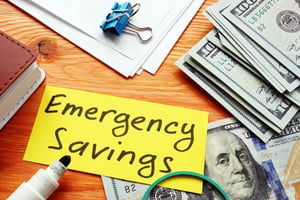10 Easy Tips for Saving and Managing Money
You’ve got 99 problems. Don’t let managing your money be one of them. There are a lot of different ways to manage and save money that don’t require a...

Most articles on personal finance make the assumption that you’re getting a regular paycheck from your company. Unfortunately, this assumption leaves out a lot of people who make most, if not all, of their salaries in tips and who consequently have financial issues that regular paycheck earners often don’t have to think about.
The fact is that tipped workers can benefit from financial management just as much as people who earn a regular paycheck, if not more. If you’re one those people, here’s how to manage the money you make from your tips.
One of the biggest issues people who earn tips face is the temptation to spend the tip money they made after their shift is over, whether it’s going out with friends or putting some gas in their car.
You can resist this temptation by depositing your tips in a bank account as soon as possible. You might be tired after your shift ends, but take a few minutes to swing by your financial institution of choice and deposit the money you made during your shift. Not only is this a great way to resist temptation, but it’s also an excellent way to keep track of the money you bring in.
It’s important to point out that many financial institutions, including First Alliance Credit Union, will let you deposit cash in your account even if the institution itself isn’t open. Just make sure to save any tips you made from coins and deposit them when your bank or credit union's lobby is open.
It’s not a secret that everyone can benefit from having a budget. If you make most of your money from tips, though, you’ll get more benefit from a budget than people who get a regular paycheck. If you make a budget, you’ll be able to prepare yourself for the lean months, make sure your necessities are paid off each month and make sure any extra money you earn gets put to the best possible use.
 Before you can create a budget, though, you’ll need to figure out just how much you’re bringing in. The best way to do that is go through the last three to four months of your bank statements, figure out how much money you made during each of those months, then use those amounts to figure out your average monthly income. It’s worth pointing out that if you deposit all your tips in your bank account instead of spending them, this process will be much easier.
Before you can create a budget, though, you’ll need to figure out just how much you’re bringing in. The best way to do that is go through the last three to four months of your bank statements, figure out how much money you made during each of those months, then use those amounts to figure out your average monthly income. It’s worth pointing out that if you deposit all your tips in your bank account instead of spending them, this process will be much easier.
Once you’ve figured out your average monthly income, you can continue creating your budget by listing your monthly expenses. As you’re listing your expenses, though, divide them into two categories—necessities and nice-to-haves.
When you’ve finished listing all your expenses, you’ll want to total up all your necessary expenses first. This will be the minimum amount you need to bring in each month, and you should easily be able to cover those expenses with your average monthly income. Then add your nice-to-have expenses to your necessities and make sure the combined total is equal to or less than your average monthly income.
From this point on, prioritize your necessity expenses each month. Once you’ve taken care of them, you can put your tip money toward your nice-to-have expenses.
Unfortunately, the income you earn from tips can be unpredictable. You might earn twice what you’re used to one month, but only get two-thirds of what you were expecting the month after that. This is why you need to build up your savings as soon as possible.
 While many financial experts recommend starting out saving at least 5% of your income and gradually building up to as much as 20%, you should ideally be as aggressive as possible. Try to have a savings goal of at least 10% to start, and put any money you get that is above your monthly average in your savings account as well. The sooner you have a robust emergency fund, the less you’ll have to worry if you encounter a lean month or two.
While many financial experts recommend starting out saving at least 5% of your income and gradually building up to as much as 20%, you should ideally be as aggressive as possible. Try to have a savings goal of at least 10% to start, and put any money you get that is above your monthly average in your savings account as well. The sooner you have a robust emergency fund, the less you’ll have to worry if you encounter a lean month or two.
If you really want to ensure your financial security, create a second emergency account once you’ve saved at least $2,000 in your primary emergency fund. Keep putting the money that you’ve budgeted for your savings in your first emergency account, then put any extra money you’ve earned over your monthly average in the second emergency account.
Once you have your two accounts set up, use the money in your second emergency account to help cover costs whenever you have a lean month or two. This will protect the savings you have in your first emergency account, which will leave you better able to withstand a financial emergency.
People whose income comes mainly from tips face some challenges that people who get a regular paycheck don’t have to worry about. However, if you focus on saving money first and make a budget that accounts for the fact that your income can change from month to month, you’ll discover all the rewards that managing your finances has to offer.
You can also get help managing your finances when you become a member of First Alliance Credit Union today. You can deposit up to 50 bills in cash any time at any branch that has a drive-up Advisor Supported Kiosk, and you can keep track of your income and expenses by using the My Money tool in our robust online banking platform and mobile app.

You’ve got 99 problems. Don’t let managing your money be one of them. There are a lot of different ways to manage and save money that don’t require a...

For the most part, we are fortunate to live in a stable society. A high rate of unemployment is usually considered 6 percent, and while at least 55%...

If you’ve ever owned a pet, you know the joy and companionship they can provide. You probably also know about the responsibility of owning a pet, a...